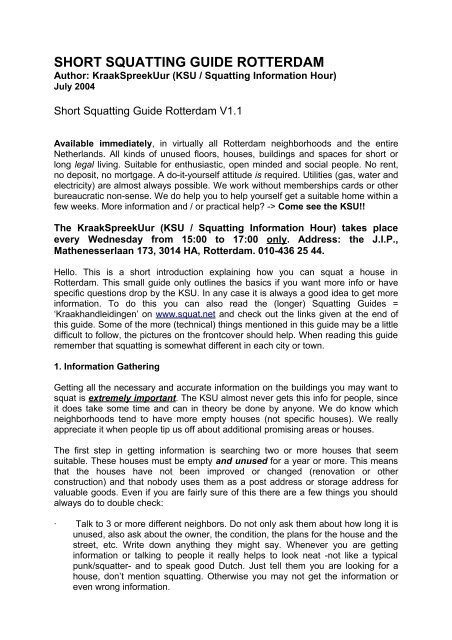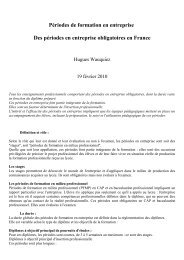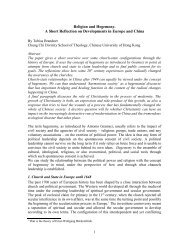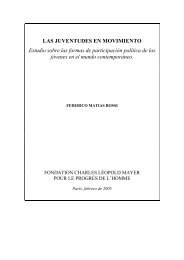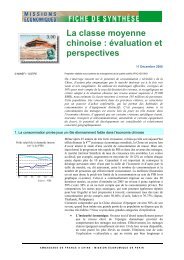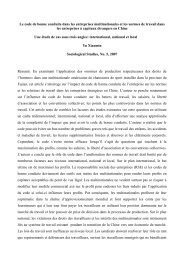SHORT SQUATTING GUIDE ROTTERDAM
SHORT SQUATTING GUIDE ROTTERDAM
SHORT SQUATTING GUIDE ROTTERDAM
Create successful ePaper yourself
Turn your PDF publications into a flip-book with our unique Google optimized e-Paper software.
<strong>SHORT</strong> <strong>SQUATTING</strong> <strong>GUIDE</strong> <strong>ROTTERDAM</strong><br />
Author: KraakSpreekUur (KSU / Squatting Information Hour)<br />
July 2004<br />
Short Squatting Guide Rotterdam V1.1<br />
Available immediately, in virtually all Rotterdam neighborhoods and the entire<br />
Netherlands. All kinds of unused floors, houses, buildings and spaces for short or<br />
long legal living. Suitable for enthusiastic, open minded and social people. No rent,<br />
no deposit, no mortgage. A do-it-yourself attitude is required. Utilities (gas, water and<br />
electricity) are almost always possible. We work without memberships cards or other<br />
bureaucratic non-sense. We do help you to help yourself get a suitable home within a<br />
few weeks. More information and / or practical help? -> Come see the KSU!!<br />
The KraakSpreekUur (KSU / Squatting Information Hour) takes place<br />
every Wednesday from 15:00 to 17:00 only. Address: the J.I.P.,<br />
Mathenesserlaan 173, 3014 HA, Rotterdam. 010-436 25 44.<br />
Hello. This is a short introduction explaining how you can squat a house in<br />
Rotterdam. This small guide only outlines the basics if you want more info or have<br />
specific questions drop by the KSU. In any case it is always a good idea to get more<br />
information. To do this you can also read the (longer) Squatting Guides =<br />
‘Kraakhandleidingen’ on www.squat.net and check out the links given at the end of<br />
this guide. Some of the more (technical) things mentioned in this guide may be a little<br />
difficult to follow, the pictures on the frontcover should help. When reading this guide<br />
remember that squatting is somewhat different in each city or town.<br />
1. Information Gathering<br />
Getting all the necessary and accurate information on the buildings you may want to<br />
squat is extremely important. The KSU almost never gets this info for people, since<br />
it does take some time and can in theory be done by anyone. We do know which<br />
neighborhoods tend to have more empty houses (not specific houses). We really<br />
appreciate it when people tip us off about additional promising areas or houses.<br />
The first step in getting information is searching two or more houses that seem<br />
suitable. These houses must be empty and unused for a year or more. This means<br />
that the houses have not been improved or changed (renovation or other<br />
construction) and that nobody uses them as a post address or storage address for<br />
valuable goods. Even if you are fairly sure of this there are a few things you should<br />
always do to double check:<br />
· Talk to 3 or more different neighbors. Do not only ask them about how long it is<br />
unused, also ask about the owner, the condition, the plans for the house and the<br />
street, etc. Write down anything they might say. Whenever you are getting<br />
information or talking to people it really helps to look neat -not like a typical<br />
punk/squatter- and to speak good Dutch. Just tell them you are looking for a<br />
house, don’t mention squatting. Otherwise you may not get the information or<br />
even wrong information.
· Look if there is a lot of mail in the hallway / the letterbox, if there is a lot and<br />
nobody picks it up this is good sign. Go take a look often, including in the<br />
evening (lights). Put a sharpened match between the door and doorframe. If this<br />
stays in place, the house is probably not being used. Make sure you also check<br />
the house the night before you squat.<br />
· Look through the windows and check if there is a lot of dust on the windowsill,<br />
check if there are cobwebs between the door and doorframe or “fake” curtains.<br />
· Someone who speaks good Dutch should call the Eneco* (electricity company)<br />
and ask when the power was cut off. You may have to call 2 or more times and<br />
talk to a few different people/make up a likely excuse before you get this<br />
information. If the electricity was cut off more than a year ago this is a good sign,<br />
if it was not cut off at all this is not necessarily bad.<br />
Except for the Eneco it is essential to go by organizations in person rather than<br />
calling for information. If you do have trouble with calling the Eneco pay them a visit<br />
as well.<br />
· The next important step is finding out who the owner of the house is. The City<br />
Informatie Centrum (CIC) have some very useful and free information. You must<br />
go see them in person.<br />
When you go to the CIC show them your squat address and tell them you would like<br />
a print out with information about the owner and such. Officially you can only get one<br />
address at a time for free but you can go with a few people or come back again.<br />
Don’t tell them you plan to squat, say you want the information because you want to<br />
contact the owner to rent or possibly buy the place or make up another good excuse.<br />
Next also say you want to know if building, renovation or demolition permits have<br />
been applied for and / or issued for your houses. (Bouw, renovatie of<br />
sloopvergunningen aangevraagd en / of afgegeven.) Again –only if asked why- make<br />
up a believable excuse: say you live in the area and heard some rumors and want to<br />
know for sure. If permits have been applied for or given you need to know when they<br />
were applied for and when they plan to do something in or with the house. There is<br />
not much point in squatting a house that will certainly be torn down in 2 months…<br />
Especially since a judge and possibly the police will almost always favor the owner if<br />
he has concrete plans he can prove with documents. When you ask about these<br />
permits it is quite likely they will give you a number and a time to call about them or<br />
send you to one of their specialized workers (bouwinspecteur). That’s even better,<br />
make sure you call the bouwinspecteur.<br />
When you ask at the CIC who the owner is (print-out) they may say you must identify<br />
yourself because the owner is private and not an organization. If this happens don’t<br />
tell them your name or other details! In this situation the best thing to do is just say<br />
“nevermind, thank you” and then –if you want to squat from a private owner- go the<br />
Kadaster (see below). This organization does not ask you to identify yourself but will<br />
usually charge you about 8 Euro for their information. If the owner is private you can<br />
still get information about permits at the CIC without having to tell them anything<br />
about yourself. Permits are public information no matter who owns the house. Finally
at the Kamer Van Koophandel (see phonebook) you can find out when a company<br />
moved out of a building and where to. Even though getting information is not difficult<br />
no matter who the owner is the KSU usually advises people to squat from<br />
‘woningbouwverenigingen’ (housing councils) rather than companies or even less<br />
desirable, private owners. If you are not sure you can check in the gray phonebook if<br />
the organization you are dealing with is a council. The reason why squatting from<br />
councils is better is that they are very unlikely to do anything illegal (intimidation,<br />
violence, eviction) unlike companies or private owners. Since the majority of (empty)<br />
houses in Rotterdam is owned by councils it only makes sense for inexperienced<br />
squatters to squat them first unless they are very prepared and very motivated.<br />
It is always a good idea to pay a visit to the KSU and ask about a particular house,<br />
we may know something about the owner, house or area that could help you a lot.<br />
2. Other Preparation<br />
Never squat alone or with few people (7 or 8 is o.k. for a small apartment or house,<br />
more for bigger or special buildings) discuss and plan things well. Make sure that a<br />
good number of people can actually stay around the clock for a day or two. At least<br />
one person should speak good Dutch. Gather the following stuff in advance:<br />
· A functional/symbolic “squat set” for each house or floor you will squat, a squat<br />
set is: a small chair, a small table, an air-mattress and a sleeping bag. Folding or<br />
camping stuff is best for a squat set since it is small and light.<br />
· A suitable lock and good tools.<br />
· Old Stuff (shirts, vases, candles etc) to put in the window so the place looks<br />
lived in.<br />
Buy a lock of the same type as is already on the door. If the lock is of the ‘oplegslot’<br />
type, a good and cheap brands is Benco, E 20,- for sale in very few places, De Jong<br />
IJzerhandel (hardware store) often has them. Don’t get cheaper / other brands as<br />
they are either awful quality or double the cost.<br />
If there is only one lock of the oplegslot type on the door you will need at the very<br />
least the following tools for breaking open the door and mounting the lock<br />
successfully:<br />
· 2 good crowbars, hammer, new lock, temporary lock (two thick eyelet screws<br />
and a padlock), good (pozidrive) screws in sizes, 4.5 * 30, 4.5 * 45, 4.5 * 60mm,<br />
about 16 of each, screwdrivers in all the common shapes and sizes. Old flat<br />
screwdrivers, a few small pieces of cardboard from a box -can help when putting<br />
on the new lock-, a wood chisel about 1.5 cm wide, a battery powdered drill (can<br />
be rented!) and mobile phones with plenty of battery and credit!<br />
If the lock is of the “profielcylinder” type pay especial attention to the metal plating<br />
(beslag) around it. How thick is it, of what material is it made, how is it attached. How<br />
far does the cylinder stick out? Are there any brands or stars printed on the material?<br />
For a replacement profielcylinder “Corben” is the only brand worth buying (cheap and<br />
good quality). It is always a good idea to push on the door at various heights. By<br />
feeling and observing how much the door ‘gives’ you can see which locks are<br />
actually locked and to some extent whether the door will be difficult or not. Always
check if there is a so-called anti-inbraakstrip mounted. Taking digital pictures of the<br />
door and lock is also good. You can always show the print outs to the KSU. We have<br />
special tools and other gear which make getting in a much easier, these can be<br />
borrowed. We do ask a deposit (new value of tools and gear) and the tools must be<br />
returned very quickly and in good condition or else we may be forced to buy new<br />
ones.<br />
· Write the letters to the owner and the neighborhood (see below), make sure you<br />
have the correct address and phone so you can reach the owner quickly.<br />
· When you go squatting take all the papers you have gotten from gathering<br />
information and any legal papers you may have (see below).<br />
3. The Squatting Itself<br />
Make sure nobody in the group has any form of identification (not even membership<br />
cards or pieces of paper). Agree beforehand which alias –fake name- everyone will<br />
use. As a general rule you should never give your name to the owner –doing so will<br />
make it easier for him to take (legal) action- or the police.<br />
When squatting find the quickest and quietest way to get in with the least damage<br />
(the back, the roof, the garden, the basement, a sliding window). If these are not<br />
good options you can break open the front door. This is a bit more risky, you will<br />
need people keeping an eye out. Although living in a squat is totally legal damaging a<br />
door, lock etc. is not. It is a very minor crime so be quick and neat. Good tools,<br />
technical insight, steady nerves and cooperation are essential when getting in.<br />
Squatted!:<br />
When the door is open let everyone and set up the squat set real quick. It is best that<br />
the squat set is visible from the street. In the meantime barricade your door and / or<br />
replace the lock fast. The cheapest and quickest barricade is a beam of wood (about<br />
120 * 8 * 4 or thicker) and two small but thick pieces of wood (15 * 8 * 4) with four<br />
screw holes each. As soon as the door is open and the squat set is on the way you<br />
mount the first small board on the door about 7 cm below the lock. Then you mount<br />
the second one on the floor making sure that you jam the beam tight between the two<br />
small boards. If the 8 or more screws you used are thick and long, the fit is tight and<br />
the beam is at about a 45 degree angle you should have a door that is hard to open<br />
from the outside. With a functioning barricade you can put a lookout just outside the<br />
door and work on replacing the lock. At the first sign of trouble you can very quickly<br />
and solidly jam the door shut with the beam.<br />
About 65% of the doors have so called ‘oplegslot met vaste cylinder’. Once the door<br />
is open you can remove the both parts of the lock by unscrewing 8 screws. It takes a<br />
bit of practice to be able to mount the new lock quickly. Practicing on the door of<br />
some friends first might be a good idea. When buying the lock you should know on<br />
which side the lock is as seen from the street;<br />
Lock is on left : you will need a lock for a ‘rechtsdraaiende deur’.<br />
Lock is on right : you will need a lock for a ‘linksdraaiende deur’.
Dealing with the police and owner<br />
Don’t be intimidated by police or the owner. If you don’t want them to come in they<br />
may not do so legally unless the police has special permission and a document<br />
called a ‘last tot binnentreden’. Very important, before you squat surf to:<br />
www.rhizomes.nl/Laws Wetgeving.html<br />
This page consists of the most important laws that apply to squatting. Print this out,<br />
read and understand it. It is in Dutch but having this on you when you squat can<br />
often make all the difference between being illegally evicted or keeping your<br />
new home.<br />
If at all possible squat during the week, Fridays and the weekend stink because you<br />
will almost certainly not be able to reach a buurtagent or the owner. In other words<br />
you may have to hang around the empty squat for days in relative insecurity…<br />
Someone who is Dutch or speaks perfect Dutch should calmly explain the situation to<br />
the police. This way the police will hopefully think all the people are Dutch. If you are<br />
not Dutch and don’t speak good Dutch it is best not to say anything to them since if<br />
they figure out you are “foreign” you are legally required to identify yourself if asked.<br />
Remember: failing to do so is theoretically enough for them to arrest you, perhaps<br />
even deport you if you are not from the EU! Even so, foreigners should not carry<br />
papers when squatting either. If the police don’t have a good reason to believe you<br />
are foreign (accent!) they may not indefinitely assume you are.<br />
You do not have to explain to the police how you got in, it is best to politely refuse to<br />
say anything about this or to say the door / window was open. Whatever you do, do<br />
not admit to damaging anything.<br />
There used to be a rule that you could be evicted within the first 24 hours of squatting<br />
a house. This rule no longer applies and you have the right to live in a house and are<br />
protected from the moment you set up your squat set and close the door behind you<br />
with a new lock. The police is sometimes behind the times and may not know this<br />
rule has changed. If they ask about how long you have been in the squat just tell<br />
them you have been there for more than 24 hours and show them the legal papers<br />
(from the internet site) to explain that it is actually not even relevant anymore.<br />
You can, but don’t have to, let one or two (no more!) policemen in to check that the<br />
place is truly empty (Leegstand constateren). This may sometimes be usefull, if a<br />
policeman comes in write down the name or policenumber of the policeman. Then<br />
when the owner or other police drop by and start being difficult you can refer them to<br />
this policeman. Make sure you that for the first 1-2 days or so there are enough<br />
people in the squat. This is more fun and handy if the police or owner should “visit”.<br />
The more people the less likely they will try to talk or throw you out (=illegal).<br />
Some owners (in particular private owners) have been known to send around some<br />
big friends or construction workers who want to throw you out or trash the place. This<br />
is rare but if it happens don’t let them in and call the police. After all you have a right<br />
to be there and they should offer you protection. However, the police does not<br />
always do that which they should.
If the owner has or pretends to have a plan with the house he will let you know.<br />
Probably through a letter saying that you must leave within so many days. You don’t<br />
have to worry too much about this letter and others like it. But if a special paper<br />
which summons you to court arrives, you must decide if you will leave or try to win in<br />
court. The owner will have to prove in court that he really has plans. Courtcases –<br />
which are usually in the form of a so-called ‘kort geding’- can be and are won by<br />
squatters. Going to court does sometimes cost you money but not necessarily a lot.<br />
The KSU can help you with this as they have some legal knowledge and a lawyer<br />
that may be able to help.<br />
The KSU usually suggests writing a polite letter -we have examples- to the owner<br />
before the actual squatting. In this letter you can offer to pay (a low) rent. If you have<br />
this letter ready you can deliver it in person to the owner right after you have spoken<br />
to the police. The sooner you do this, the sooner you will know how the owner feels<br />
about the squatting. You almost never end up paying rent since this gives you even<br />
more rights and the owner many responsibilities but the important thing is to offer it.<br />
Often the owners will want to offer you an ‘om-niet-contract’ (also called ‘anti-kraak’<br />
or ‘tijdelijke verhuur’). 9 out of 10 times this is a bad contract which is usually only in<br />
the interest of the owner. In practice it means –among other shitty things- that he can<br />
kick you out whenever he wants with little notice. There are very few cases in which<br />
considering signing such a contract might be o.k.<br />
Come by the KSU with the contract if you have any doubts at all.<br />
If the police doesn’t show up right after you have everyone and everything inside as<br />
well as the lock mounted you can go talk to them yourself. The KSU does this 90% of<br />
the time since it offers a few advantages in most situations.<br />
Two persons –the rest should stay in the house- can go to the nearest police station<br />
and talk to a ‘buurtagent’ (neighborhood police) and explain the situation. This type of<br />
police is usually much friendlier and social to squatters than normal police. Also it<br />
gives you a good opportunity to explain that you have squatted the place legally and<br />
that you are nice people that will improve the house and neighborhood. Compare this<br />
to a panicked neighbor or the owner calling the police and saying “Junkies have<br />
broken into the house and it sounds like they are trashing the place”… The reaction<br />
of the police will be totally different and it is very likely that the outcome will be<br />
different as well. In other words if at all possible make sure the police comes in to the<br />
picture when you are expecting them and while you are with many people. This<br />
makes things easier and safer for you.<br />
You can ask the buurtagent to make a ‘mutatie’. This is an official police record in the<br />
computer which in the future you may be able to use as proof that you did squat the<br />
house and that is was empty when you did. So whenever possible ask the buurtagent<br />
for the ‘mutatienummer’ plus his name or number and write it down together with the<br />
date. Before you find a buurtagent on duty which is willing to make a mutatie you<br />
may need to go to 2 or even 3 police stations or try again the next day.<br />
On rare occasions people get arrested because of squatting. When this happens the<br />
police will almost never keep you for long, but only if you do not say anything and<br />
there is no way for them to find out your identity! If this is the case a couple of hours<br />
or a day is usually the longest time you will spend in a cell. When you are arrested by
the police you can often assume they will say almost anything (yes, they lie often and<br />
without shame) to find out who you are and what you did. Do not say or sign<br />
anything. If they say they can ‘keep your for weeks’ and that ‘you are in a lot of<br />
trouble because you were breaking in’, and that ‘your friends already told us’ don’t<br />
believe and don’t answer them in any shape or form. Not speaking will NOT result in<br />
a criminal record while speaking may give a lot of problems!<br />
4. Other concerns after you squat<br />
To get into contact with the neighborhood, you can make a letter in which you:<br />
explain why you squatted, tell them in which house you’re living and that they are<br />
welcome to have some coffee in your new house etc. The KSU has some examples<br />
of these letters. Being and remaining considerate to the neighborhood is a good idea,<br />
the more people are with you the better.<br />
If you have money for gas and electricity (water is usually connected) you have to<br />
call the Eneco again. Not paying for utilities is usually a very bad idea. Your pipes<br />
and wires must be in good working order before they will connect you. If gas and<br />
electricity are still connected you can call and ask them to send you a transfer form<br />
(overschrijvingformulier). On this simple form you will usually have to fill in that you<br />
did not know the previous user –most likely with an empty building- if they then put<br />
the contract on your name it will only cost you E 13.45,-.<br />
Connecting the power and gas if they are turned off will require an appointment with<br />
an Eneco worker, this will cost you E 39.95,-. After this your monthly cost will usually<br />
be between E 70,- and E 150,- for a floor or small house. Check with the Eneco. The<br />
Eneco will always connect the television cable (costs about E 12,- / month) when<br />
they connect the other utilities unless you specifically ask them not to. Getting a<br />
phone or Internet connection is no problem. Call the appropriate companies such as<br />
KPN and Chello.<br />
Summing up:<br />
1. First spot a few empty and unused houses.<br />
2. Get all the necessary and reliable information about the buildings.<br />
3. Get all your gear and legal papers in order and ask plenty of people to help.<br />
4. Squat, set up squat set, mount barricade / new lock, clean up.<br />
5. If you decide to notify police, neighbors and owners of your presence do so as<br />
quickly and friendly as possible.<br />
5. Information about the KSU Rotterdam<br />
If you really can not drop by the KSU (this is always better) you can also call or mail:<br />
rotterdam@jip.org. Bear in mind this mail is not checked very often.<br />
There are a few experienced squatters in Rotterdam that the KSU knows. These<br />
people often help with the practical side of squatting. They function as a “breaking<br />
crew”, mount locks and talk to the police & owner. These people have a lot of tools<br />
and will usually increase the chance of success greatly. They do not ask for money<br />
but appreciate any donations very much. However these people do have a few
equirements before they will consider helping out:<br />
1. You must have all the information gathered in the way that is explained in this<br />
guide.<br />
2. You must have this information on two squatable houses that are suited to your<br />
needs and be willing to make good agreements / appointments with them. For<br />
example these people expect you to be on time and sober!<br />
3. You must be willing to take financial responsibility for their tools and gear unless<br />
you really have no money.<br />
4. Expect to have to wait before these people can help you. Remember these people<br />
are strictly volunteer and have private lives. It may take five days or eight weeks<br />
before they can help you, depending on the circumstances.<br />
5. Some information for non-European Union people<br />
Squatting always comes with a relatively small risk of getting into trouble with the<br />
police or the law. As explained before for people that are not from Europe the risks<br />
are a fair bit higher since with a “foreigner” status you have fewer rights and are often<br />
“illegal”. This does not mean that you can not or should not squat. Non-EU people<br />
have and do squat in Rotterdam. It does mean you have to be very careful, prepare<br />
very well and try hard to get some Dutch people to help you.<br />
6. The links below are a treasure trove of information! Especially if you follow the<br />
various links to for example “kraakhandleidingen” and the many questions &<br />
answers.<br />
WWW.RHIZOMES.NL, our own website, lots of additional info.<br />
WWW.SQUAT.NET, lots of info on everything related to squatting.<br />
WWW.KRAKENPOST.NL, here you can read news and pose questions about<br />
squatting. Check the rules, read the manuals and previous posts first!<br />
WWW.KRAAK-FORUM.TK, similar to KRAKENPOST, great answers to lots of<br />
common questions. Again, read and check before you post questions.<br />
WWW.KRAKEND<strong>ROTTERDAM</strong>.ORG<br />
Final Note: Living in a squat is legal and often means a very cheap, quick way of<br />
housing yourself and possibly friends for weeks, months or years -depends on<br />
situation and on you-. Compare that with the three year waiting list for an expensive<br />
rental and draw your own conclusions.
KraakSpreekUur (KSU / Squatting Information Hour), July 2004<br />
http://creativecommons.org/licenses/by-nd/2.0/fr/deed.fr


